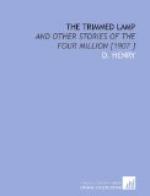“Oh! I’ll take ’em,” said Plumer. “All that’s included in the fall. Thanks. And for the very good dinner. I shall sleep on feathers to-night and dream of Bagdad. I hope it won’t turn out to be a dream in the morning. Farewell, most excellent Caliph!”
Again Chalmers paced restlessly upon his rug. But his beat lay as far from the table whereon lay the pastel sketch as the room would permit. Twice, thrice, he tried to approach it, but failed. He could see the dun and gold and brown of the colors, but there was a wall about it built by his fears that kept him at a distance. He sat down and tried to calm himself. He sprang up and rang for Phillips.
“There is a young artist in this building,” he said. “—a Mr. Reineman—do you know which is his apartment?”
“Top floor, front, sir,” said Phillips.
“Go up and ask him to favor me with his presence here for a few minutes.”
Reineman came at once. Chalmers introduced himself.
“Mr. Reineman,” said he, “there is a little pastel sketch on yonder table. I would be glad if you will give me your opinion of it as to its artistic merits and as a picture.”
The young artist advanced to the table and took up the sketch. Chalmers half turned away, leaning upon the back of a chair.
“How—do—you find it?” he asked, slowly.
“As a drawing,” said the artist, “I can’t praise it enough. It’s the work of a master—bold and fine and true. It puzzles me a little; I haven’t seen any pastel work near as good in years.”
“The face, man—the subject—the original—what would you say of that?”
“The face,” said Reineman, “is the face of one of God’s own angels. May I ask who—”
“My wife!” shouted Chalmers, wheeling and pouncing upon the astonished artist, gripping his hand and pounding his back. “She is traveling in Europe. Take that sketch, boy, and paint the picture of your life from it and leave the price to me.”
THE RUBAIYAT OF A SCOTCH HIGHBALL
This document is intended to strike somewhere between a temperance lecture and the “Bartender’s Guide.” Relative to the latter, drink shall swell the theme and be set forth in abundance. Agreeably to the former, not an elbow shall be crooked.
Bob Babbitt was “off the stuff.” Which means—as you will discover by referring to the unabridged dictionary of Bohemia—that he had “cut out the booze;” that he was “on the water wagon.” The reason for Bob’s sudden attitude of hostility toward the “demon rum”—as the white ribboners miscall whiskey (see the “Bartender’s Guide"), should be of interest to reformers and saloon-keepers.
There is always hope for a man who, when sober, will not concede or acknowledge that he was ever drunk. But when a man will say (in the apt words of the phrase-distiller), “I had a beautiful skate on last night,” you will have to put stuff in his coffee as well as pray for him.




